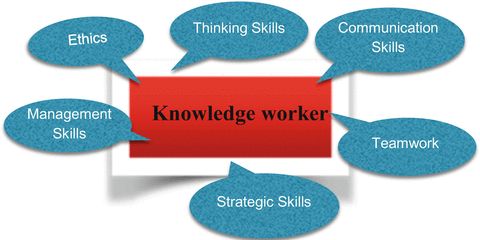
The Global context..
“Global context provides a common language for powerful contextual learning, identifying specific settings, events or circumstances that provide more concrete perspectives for teaching and learning. Within this context, currently we can identify the importance and benefits of knowledge workers in all industries than any other periods in the history.”
A knowledge worker...
A person whose job involves handling or using information called as a Knowledge worker. He performs to think to solve complex problems, to develop new services or products, to produce findings from research in a specific format.
The importance of knowledge workers can be emphasized in the information technology industry roles; i.e; web designers, coders, programmers and analysts. In our point of view; the knowledge workers are required as accountants, analysts, Architects, lawyers, scientists, pharmacists, copywriters, engineers and etc. in different industries such as Finance, Marketing, Architecture, Constructions, Engineering, Telecommunication & etc.

Importance of knowledge workers to expect a rapid growth of the organization in Global context…
With the development of globalization; we can observe the expansion of knowledge work in industries;
-priority goes to information societies,
-Generations with higher education enter the workforce,
- Technology replaces manual human labor,
-skill levels increase on the average.
Observations of expansion & implementation of knowledge work..
In this global context; a revolution is in place as its’ becoming independent of location when it comes to a work place, time and tools. Work is not tied to locations; work and free time are blurred. Within the concept of global context; the knowledge work labor markets are opened up globally.
The retirement ages are on the rise and careers get longer. At the same time background and work experiences of knowledge workers are becoming diverse which lead to differences in cultural expectations, work practices, education, and even cognitive abilities of knowledge workers.
In organization’s point of view, in-house and external knowledge workers form a resource pool, and workers are assigned to projects based on required competences.

For individual workers, these changes mean constant marketing and maintenance of competences, and the precedence of reputation mechanisms over hierarchical positions.
Combinations of tools have taken place of many individual workers, but knowledge workers have personal and subjectively most efficient preferred toolsets.
The boundaries of technological capability continue to expand. In the long run, any repetitive or routine work, can be automated which causes significant efficiency increasing & replacing instead of human labor.
Data is an important source of economic value and permeates all sectors of society. Data from diverse sources into meaningful results has become an important part of knowledge work.
According to article ‘The trends shaping work and working lives’ in CIPD 2013; increased female labour market participation can be identified. As a result of global context, the workforce is now split almost evenly by gender. It mentions that “employers have a much wider talent pool available to them, with more women joining and staying in the labour force”.
Conclusion
The management in all organizations; should be vigilant on paying even & competitive wages & transparent policies for promotions to reduce turnover, to increase the job satisfaction. At the same time with the concepts of ‘in-house’ and ‘external knowledge work’, it is difficult to identify and implement common HR practices such as employee engagement, upward problem solving and etc.
Referances
Lehtiniem, T., 2015. Trends of Knowledge Work and Needs for Knowledge Work Tools. Re:Know, [Online]. 1, 1-7. Available at:
https://www.cs.helsinki.fi/u/floreen/Trends_Needs_White_Paper_June_2015.pdf [Accessed 8 January 2020].
https://www.cs.helsinki.fi/u/floreen/Trends_Needs_White_Paper_June_2015.pdf [Accessed 8 January 2020].
Telapplicant. 2019. The Importance of Knowledge Workers. [ONLINE] Available at: https://www.telappliant.com/blog/the-importance-of-knowledge-workers/. [Accessed 9 January 2020].
CIPD 2013 The Trends Shaping Work & Working Lives. [ONLINE] Available at https://www.cipd.co.uk/Images/megatrends_2013-trends-shaping-work_tcm18-11401.pdf. [Accessed 9 January 2020].

The fact "Work is not tied to locations" that you have mentioned is 100% accountable, this will surely open up to the global market, I agree with this is because I myself have worked remotely for different organizations as an IT professional.
ReplyDeleteThe global context with the knowledge worker,you have well explained about the subject.great work.
ReplyDeleteI like your topic and interestingly written. However you need to put citations within the text as per the format expected.
ReplyDeleteAs organizations grow and adapt increasingly progressed innovation, the concept of a workgroup is not constrained to people who work closely together in the same location.
ReplyDeleteThe effects and implications of globalisation and education in relation to nationalism and education research and policy, by considering knowledge in the context of changing relationships between work, education and work-related learning.
ReplyDeleteGlobal communication is directly affected by the process of globalization, and helps to increase business opportunities, remove cultural barriers and develop a global village. Both globalization and global communication have changed the environmental, cultural, political and economic elements of the world.
ReplyDelete